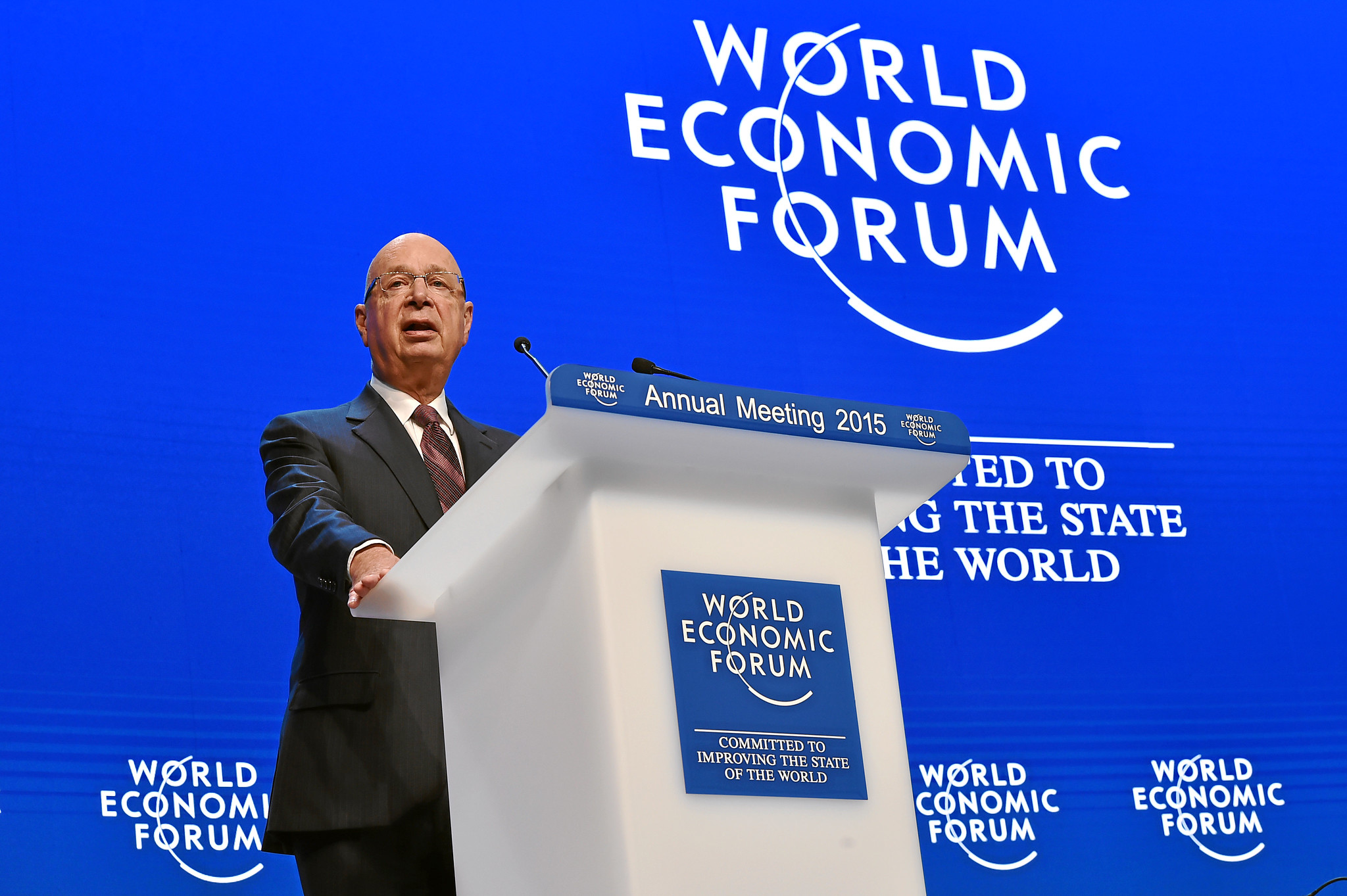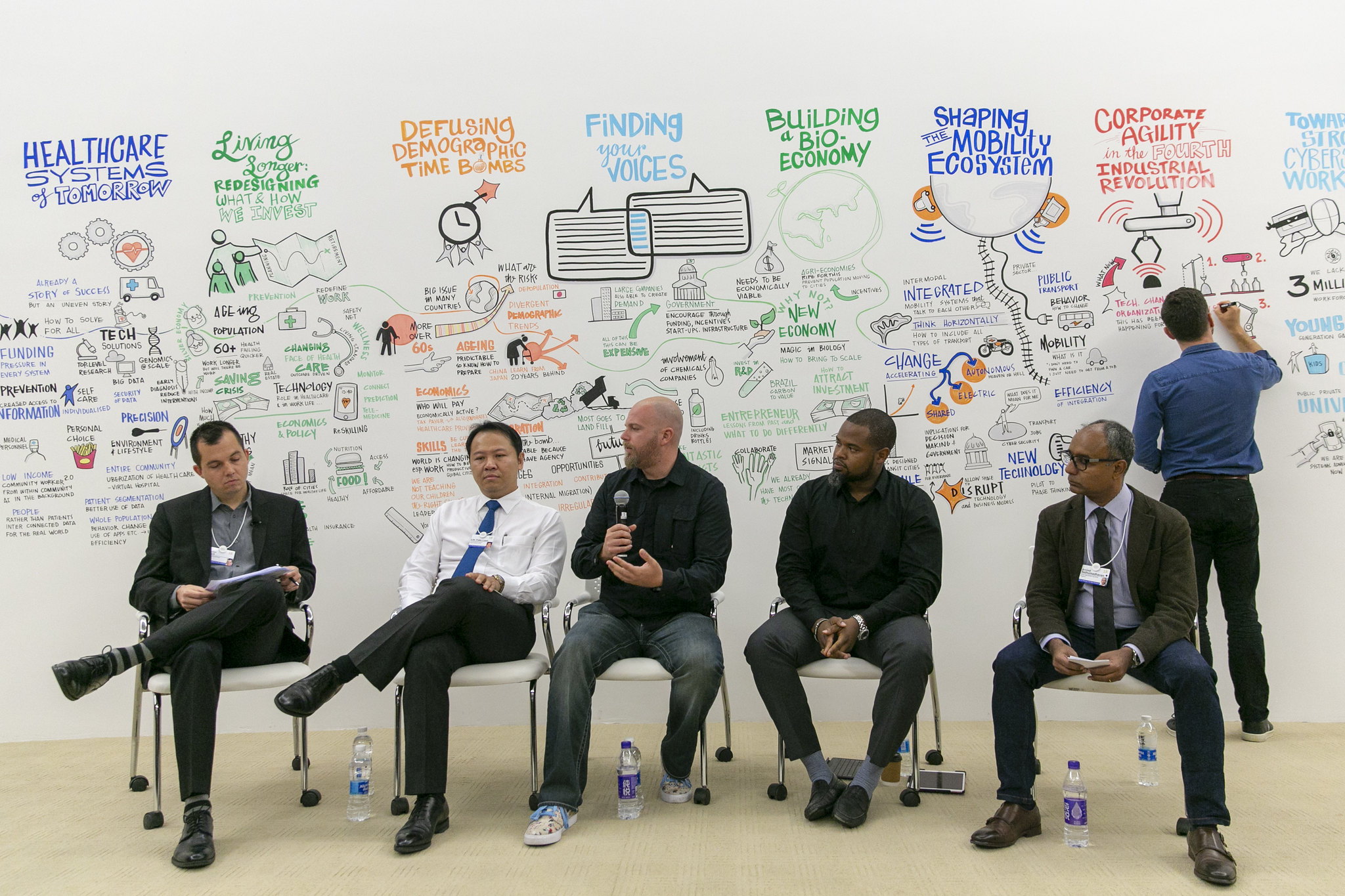In their World Economic Forum treatise Covid-19: The Great Reset, economists Klaus Schwab and Thierry Malleret bring us the voice of would-be Global Governance.

Viewing the virtual-reality film “Collisions” at a session of the World Economic Forum in Davos, Switzerland, January 2016. (World Economic Forum, Flickr, CC BY-NC-SA 2.0)
By Diana Johnstone
in Paris
Special to Consortium News
 By titling their recently published World Economic Forum treatise Covid-19: The Great Reset, the authors link the pandemic to their futuristic proposals in ways bound to be met with a chorus of “Aha!”s. In the current atmosphere of confusion and distrust, the glee with which economists Klaus Schwab and Thierry Malleret greet the pandemic as harbinger of their proposed socioeconomic upheaval suggests that if Covid-19 hadn’t come along by accident, they would have created it (had they been able).
By titling their recently published World Economic Forum treatise Covid-19: The Great Reset, the authors link the pandemic to their futuristic proposals in ways bound to be met with a chorus of “Aha!”s. In the current atmosphere of confusion and distrust, the glee with which economists Klaus Schwab and Thierry Malleret greet the pandemic as harbinger of their proposed socioeconomic upheaval suggests that if Covid-19 hadn’t come along by accident, they would have created it (had they been able).
In fact, World Economic Forum founder Schwab was already energetically hyping the Great Reset, using climate change as the triggering crisis, before the latest coronavirus outbreak provided him with an even more immediate pretext for touting his plans to remake the world.
The authors start right in by proclaiming that “the world as we knew it in the early months of 2020 is no more,” that radical changes will shape a “new normal.” We ourselves will be transformed. “Many of our beliefs and assumptions about what the world could or should look like will be shattered in the process.”
Throughout the book, the authors seem to gloat over the presumed effects of widespread “fear” of the virus, which is supposed to condition people to desire the radical changes they envisage. They employ technocratic psychobabble to announce that the pandemic is already transforming the human mentality to conform to the new reality they consider inevitable.
“Our lingering and possibly lasting fear of being infected with a virus … will thus speed the relentless march of automation…” Really?
“The pandemic may increase our anxiety about sitting in an enclosed space with complete strangers, and many people may decide that staying home to watch the latest movie or opera is the wisest option.”
“There are other first round effects that are much easier to anticipate. Cleanliness is one of them. The pandemic will certainly heighten our focus on hygiene. A new obsession with cleanliness will particularly entail the creation of new forms of packaging. We will be encouraged not to touch the products we buy. Simple pleasures like smelling a melon or squeezing a fruit will be frowned upon and may even become a thing of the past.”
This is the voice of would-be Global Governance. From on high, experts decide what the masses ought to want, and twist the alleged popular wishes to fit the profit-making schemes they are peddling. Their schemes center on digital innovation, massive automation using “artificial intelligence,” finally even “improving” human beings by endowing them artificially with some of the attributes of robots: such as problem-solving devoid of ethical distractions.
Engineer-economist Klaus Schwab, born in Ravensburg, Germany, in 1938, founded his World Economic Forum in 1971, attracting massive sponsorship from international corporations. It meets once a year in Davos, Switzerland – last time in January 2020 and next year in May, delayed because of Covid-19.

Klaus Schwab, founder and executive chairman, World Economic Forum, on Jan. 21, 2015. (World Economic Forum, Flickr, CC BY-NC-SA 2.0)
A Powerful Lobby
What is it, exactly? I would describe the WEF as a combination capitalist consulting firm and gigantic lobby. The futuristic predictions are designed to guide investors into profitable areas in what Schwab calls “the Fourth Industrial Revolution (4IR)” and then, as the areas are defined, to put pressure on governments to support such investments by way of subsidies, tax breaks, procurements, regulations and legislation. In short, the WEF is the lobby for new technologies, digital everything, artificial intelligence, transhumanism.
It is powerful today because it is operating in an environment of State Capitalism, where the role of the State (especially in the United States, less so in Europe) has been largely reduced to responding positively to the demands of such lobbies, especially the financial sector. Immunized by campaign donations from the obscure wishes of ordinary people, most of today’s politicians practically need the guidance of lobbies such as the WEF to tell them what to do.
In the 20th century, notably in the New Deal, the government was under pressure from conflicting interests. The economic success of the armaments industry during World War II gave birth to a Military-Industrial Complex, which has become a permanent structural factor in the U.S. economy.
It is the dominant role of the MIC and its resulting lobbies that have definitively transformed the nation into State Capitalism rather than a Republic.
The proof of this transformation is the unanimity with which Congress never balks at approving grotesquely inflated military budgets. The MIC has spawned media and Think Tanks which ceaselessly indoctrinate the public in the existential need to keep pouring the nation’s wealth into weapons of war. Insofar as voters do not agree, they can find no means of political expression with elections monopolized by two pro-MIC parties.
The WEF can be seen as analogous to the MIC. It intends to engage governments and opinion manufacturers in the promotion of a “4IR” which will dominate the civilian economy and civilian life itself.
The pandemic is a temporary pretext; the need to “protect the environment” will be the more sustainable pretext. Just as the MIC is presented as absolutely necessary to “protect our freedoms,” the 4IR will be hailed as absolutely necessary to “save the environment” – and in both cases, many of the measures advocated will have the opposite effect.

Public street art on 6th Street in Austin, Texas, depicting the impact of Covid-19 closings. (Leah Rodgers, CC BY 4.0, Wikimedia Commons)
So far, the techno-tyranny of Schwab’s 4IR has not quite won its place in U.S. State Capitalism. But its prospects are looking good. Silicon Valley contributed heavily to the Joe Biden campaign, and Biden hastened to appoint its moguls to his transition team.
But the real danger of all power going to the Reset lies not with what is there, but with what is not there: any serious political opposition.
Can Democracy Be Restored?
The Great Reset has a boulevard open to it for the simple reason that there is nothing in its way. No widespread awareness of the issues, no effective popular political organization, nothing. Schwab’s dystopia is frightening simply for that reason.
The 2020 presidential election has just illustrated the almost total depoliticization of the American people. That may sound odd considering the violent partisan emotions displayed. But it was all much ado about nothing.
There were no real issues debated, no serious political questions raised either about war or about the directions of future economic development. The vicious quarrels were about persons, not policy. Bumbling Trump was accused of being “Hitler,” and Wall Street-beholden Democrat warhawks were described by Trumpists as “socialists.” Lies, insults and confusion prevailed.
A revival of democracy could stem from organized, concentrated study of the issues raised by the Davos planners, in order to arouse an informed public opinion to evaluate which technical innovations are socially acceptable and which are not.
Cries of alarm from the margins will not influence the intellectual relationship of forces. What is needed is for people to get together everywhere to study the issues and develop well-reasoned opinions on goals and methods of future development.
Unless faced with informed and precise critiques, Silicon Valley and its corporate and financial allies will simply proceed in doing whatever they imagine they can do, whatever the social effects.
Serious evaluation should draw distinctions between potentially beneficial and unwelcome innovations, to prevent popular notions from being used to gain acceptance of every “technological advance,” however ominous.
Redefining Issues
The political distinctions between left and right, between Republican and Democrat, have grown more impassioned just as they reveal themselves to be incoherent, distorted and irrelevant, based more on ideological bias than on facts. New and more fruitful political alignments could be built through confrontation with specific concrete issues.
We could take the proposals of the Great Reset one by one and examine them in both pragmatic and ethical terms.
No. 1 – Thanks to the pandemic, there has been a great increase in the use of teleconferences, using Skype, Zoom or other new platforms. The WEF welcomes this as a trend. Is it bad for that reason? To be fair, this innovation is positive in enabling many people to attend conferences without the expense, trouble and environmental cost of air travel. It has the negative side of preventing direct human contact. This is a simple issue, where positive points seem to prevail.
No. 2 – Should higher education go online, with professors giving courses to students via internet? This is a vastly more complicated question, which should be thoroughly discussed by educational institutions themselves and the communities they serve, weighing the pros and cons, remembering that those who provide the technology want to sell it, and care little about the value of human contact in education – not only human contact between student and professor, but often life-determining contacts between students themselves. Online courses may benefit geographically isolated students, but breaking up the educational community would be a major step toward the destruction of human community altogether.
No. 3 – Health and “well-being”. Here is where the discussion should heat up considerably. According to Schwab and Malleret: “Three industries in particular will flourish (in the aggregate) in the post-pandemic era: big tech, health and wellness.” For the Davos planners, the three merge.
Those who think that well-being is largely self-generated, dependent on attitudes, activity and lifestyle choices, miss the point. “The combination of AI [artificial intelligence], the IoT [internet of things] and sensors and wearable technology will produce new insights into personal well-being. They will model how we are and feel […] precise information on our carbon footprints, our impact on biodiversity, on the toxicity of all the ingredients we consume and the environments or spatial contexts in which we evolve will generate significant progress in terms of our awareness of collective and individual well-being.”
Question: do we really want or need all this cybernetic narcissism? Can’t we just enjoy life by helping a friend, stroking a cat, reading a book, listening to Bach or watching a sunset? We better make up our minds before they make over our minds.

User being monitored in a biometrics lab. (Grish068, CC BY-SA 4.0, Wikimedia Commons)
No. 4 – Food. In order not to spoil my healthy appetite, I’ll skip over this. The tech wizards would like to phase out farmers, with all their dirty soil and animals, and industrially manufacture enhanced artificial foods created in nice clean labs – out of what exactly?
The Central Issue: Homo Faber
No. 5 – What about human work?
“In all likelihood, the recession induced by the pandemic will trigger a sharp increase in labor-substitution, meaning that physical labor will be replaced by robots and ‘intelligent’ machines, which will in turn provoke lasting and structural changes in the labor market.”
This replacement has already been underway for decades. Along with outsourcing and immigration, it has already weakened the collective power of labor. But clearly, the tech industries are poised to go much, much further and faster in throwing humans out of work.
The Covid-19 crisis and social distancing have “suddenly accelerated this process of innovation and technological change. Chatbots, which often use the same voice recognition technology behind Amazon’s Alexa, and other software that can replace tasks normally performed by human employees, are being rapidly introduced. These innovations provoked by necessity (i.e. sanitary measures) will soon result in hundreds of thousands, and potentially millions, of job losses.”
Cutting labor costs has long been the guiding motive of these innovations, along with the internal dynamic of technology industry to “do whatever it can do.” Then socially beneficial pretexts are devised in justification. Like this:
“As consumers may prefer automated services to face-to-face interactions for some time to come, what is currently happening with call centers will inevitably occur in other sectors as well.”
“Consumers may prefer…”! Everyone I know complains of the exasperation of trying to reach the bank or insurance company to explain an emergency, and instead to be confronted with a dead voice and a choice of irrelevant numbers to click. Perhaps I am underestimating the degree of hostility toward our fellow humans that now pervades society, but my impression is that there is a vast unexpressed public demand for LESS automated services and MORE contact with real persons who can think outside the algorithm and can actually UNDERSTAND the problem, not simply cough up preprogrammed fixes.

“Corporate agility in the Fourth Industrial Revolution” session held in Tianjin,China, September 2018. (World Economic Forum, Faruk Pinjo, CC BY-NC-SA 2.0)
There is a potential movement out there. But we hear nothing of it, being persuaded by our media that the greatest problem facing people in their daily lives is to hear someone exhibit confusion over someone else’s confused gender.
In this, I maintain, consumer demand would merge with the desperate need of able-minded human beings to earn a living. The technocrats earn theirs handsomely by eliminating the means to earn a living of other people.
Here is one of their great ideas. “In cities as varied as Hangzhou, Washington DC and Tel Aviv, efforts are under way to move from pilot programs to large-scale operations capable of putting an army of delivery robots on the road and in the air.” What a great alternative to paying human deliverers a living wage!
And incidentally, a guy riding a delivery bicycle is using renewable energy. But all those robots and drones? Batteries, batteries and more batteries, made of what materials, coming from where and manufactured how? By more robots? Where is the energy coming from to replace not only fossil fuels, but also human physical effort?
At the last Davos meeting, Israeli intellectual Yuval Harari issued a dire warning that:
“Whereas in the past, humans had to struggle against exploitation, in the twenty-first century the really big struggle will be against irrelevance… Those who fail in the struggle against irrelevance would constitute a new ‘useless class’ – not from the viewpoint of their friends and family, but useless from the viewpoint of the economic and political system. And this useless class will be separated by an ever-growing gap from the ever more powerful elite.”
No. 5 – And the military. Our capitalist prophets of doom foresee the semi-collapse of civil aviation and the aeronautical industry as people all decide to stay home glued to their screens. But not to worry!
“This makes the defense aerospace sector an exception and a relatively safe haven.” For capital investment, that is. Instead of vacations on sunny beaches, we can look forward to space wars. It may happen sooner rather than later, because, as the Brookings Institution concludes in a 2018 report on “How artificial intelligence is transforming the world,” everything is going faster, including war:
“The big data analytics associated with AI will profoundly affect intelligence analysis, as massive amounts of data are sifted in near real time … thereby providing commanders and their staffs a level of intelligence analysis and productivity heretofore unseen. Command and control will similarly be affected as human commanders delegate certain routine, and in special circumstances, key decisions to AI platforms, reducing dramatically the time associated with the decision and subsequent action.”
So, no danger that some soft-hearted officer will hesitate to start World War III because of a sentimental attachment to humanity. When the AI platform sees an opportunity, go for it!
“In the end, warfare is a time competitive process, where the side able to decide the fastest and move most quickly to execution will generally prevail. Indeed, artificially intelligent intelligence systems, tied to AI-assisted command and control systems, can move decision support and decision-making to a speed vastly superior to the speeds of the traditional means of waging war. So fast will be this process especially if coupled to automatic decisions to launch artificially intelligent autonomous weapons systems capable of lethal outcomes, that a new term has been coined specifically to embrace the speed at which war will be waged: hyperwar.”
Americans have a choice. Either continue to quarrel over trivialities or wake up, really wake up, to the reality being planned and do something about it.
The future is shaped by investment choices. Not by naughty speech, not even by elections, but by investment choices. For the people to regain power, they must reassert their command over how and for what purposes capital is invested.
And if private capital balks, it must be socialized. This is the only revolution – and it is also the only conservatism, the only way to conserve decent human life. It is what real politics is about.
Diana Johnstone lives in Paris. Her latest book is Circle in the Darkness: Memoirs of a World Watcher and is also the author of Fools’ Crusade: Yugoslavia, NATO, and Western Delusions. Her lates book is Queen of Chaos: the Misadventures of Hillary Clinton. The memoirs of Diana Johnstone’s father Paul H. Johnstone, From MAD to Madness, was published by Clarity Press, with her commentary. She can be reached at diana.johnstone@wanadoo.fr .
The views expressed are solely those of the author and may or may not reflect those of Consortium News.
Please Contribute to Consortium News
Donate securely with
Click on ‘Return to PayPal’ here.
Or securely by credit card or check by clicking the red button:




How does an AI work-unit decide to form or join a labor union? I have the strange feeling I read about this Reset already in Jack London’s “The Iron Heel.” I also seem to have read about it in 2015 when I went through the text of the TPP, a revised version of which (CPTPP) Biden is said to be hoping to pass. This excellent article by Diana Johnstone is a wonderful and effective warning shot. We need many more such shots that concretely deconstruct the Reset and fully lay bare its class-based presuppositions and strategies.
“… a new term has been coined specifically to embrace the speed at which war will be waged: hyperwar.” Just what’s needed, more efficient ways to kill other human beings. It’s pathetic that these technocrats, for all their wizardry, are unable to move beyond the barbarism of endless war. But as usual, they won’t be the ones engaged in the wars. To them, it has all the reality of video games.
Question: What are the limits to the social application of technological inventions and their use as a means to societal control? Ms Johnson provides an articulate analysis to this question that even a USA Democrat can…or should…be able to understand. With Biden / Harris / DNC and their extreme quasi-fascist alliances, fat chance of that. My suggestion is to forward Johnson’s article to USA taxpayer funded and owned TV and radio stations and their reactionary acquaintances….certainly include their network “owners” and manipulators. Argue that this problem is paramount in our society and it needs to be confronted every day in every way, to hell with the station / network advertisers. Argue that “equal time” media initiatives need to be re-instituted after Reaganites quietly dismissed them in 1987. Extreme right-wing Democrats…need I name them…are as much to be loathed as their Republican counterparts.
The bourgeoisie really have no grasp of what happens to all those deemed “useless,” that is, of no current use to employers. I think they imagine that the jobless just sit on their couches, watching TV. The more fortunate are apparently clueless (certainly, unconcerned) about what happens when people run out of money and the rent comes due..
Without jobs, people have no money. Without money, they suffer lack of basic human survival needs. As poverty grows, the number of consumers (essential to maintaining businesses) continues to decline. Media reflects only the voices, the worries, of the remaining middle class, who are oblivious to America’s poverty crisis and impending economic collapse.
This is a lurid example of how evil it is possible to be, but its evil is nothing new. Why should we assume that the actual plutocrats are ready to join Schwab’s crusade? That part of the argument is mostly missing.
Dear Editor,
The people’s Global Resource Bank network ends government, states, politics, law, private banks, debt, interest, taxes, scarcity, poverty, pollution, hunger, war and climate change.
Question: If we live in a consumer-based society, how do these smart Davos folks expect the economy to keep growing if the consumers no longer have jobs and earnings with which to buy stuff? Even that Fascist Henry Ford understood he had to pay his employees a decent wage so they could afford to buy the product they produced.
Is this another instance of “progress” impeding real progress?
“For the people to regain power, they must reassert their command over how and for what purposes capital is invested. And if private capital balks, it must be socialized. This is the only revolution.”
You are no doubt correct. The only revolution indeed. But the question is, how to wage this revolution, and do it effectively? That is exactly the point that needs to be addressed. “Now you see that action is necessary, what action should you take?” This is what most are reluctant to discuss, but is actually the more important topic.
Great questions and suggestions here in these comments. To me, your question is somewhat answered by ranney’s point…made prior regarding education. We’ve all been psyched up on going outward. Probably time to start fathoming what’s going on down in there in living cells (viruses too, when/if they’re not viewed as “alive”).
What will be a heavy cost will be the old rhythm missing. You can have the most absurd scam/gig jobs in the world in the context of today’s industrial consumerism [mainly a “service” economy where we’re at], but humans will assign meaning to them. It’s good they can. Humans are adaptive and full of hope. But as probably was the case often with the CCC, when the old meaning/rhythm’s gone there will be some doubt and lostness moving into a new more planned paradigm…even some tedium (that the old paradigm was way too full of itself BTW). Just allow a green demos to do the planning, please not Schwab and Malleret (computers can help, but I don’t see it in the ways they’re suggeting). People have to realize how they’ve been bamboozled by Russiagate and vaccine-narrative (vaccine-narrative vs effective quick tests (media is not explaining that Pfizer’s vaccine requires ongoing “boosters; what’s anticipated by the people is a ways off)). We need a lot of humility and at the very least to have moved beyond these kinds of propagandas. Giving care (to the infirm) in today’s setting can keep folks on their toes. Coming generations should definitely start off with better education to get them on theirs.
An extraordinary article! I have been thinking that the world is becoming less human for quite a while, but when I try to say why I can’t really explain it to others very well. Diana does it wonderfully and I thank you!! I’m afraid we’re already too late. But maybe we can start to get our education system to emphasize nature and the qualities that make us human.
Excellent article! The one flaw I see is in the concluding assumption that this all depends predominantly on America, Americans, and the choices Americans make. I consider it very possible that the corrective solution has already been found and implemented, but Americans may be the last to see it.
Schwab and Malleret provide wrong substance and wrong rhythm, I can see that much. Cori Bush has the right rhythm. As for substance, there is no new field. Computers already could figure out who could do what in a global Green New Deal. Not that they should demand whomever has to go do it. They only thing the pandemic seems to me to sort of demand is that people learn more about biology and epidemiology. Let the people learn, and then let them vote. It’s a tall order. I could say right now I wish I knew enough to come up with odds on who’s right re a lab origin…Gallo or Frances Boyle. Even Vandana Shiva won’t say. And not many reading here will even know how Gallo and Boyle differ. The (quick) paper strip tests Michael Mina talks about…how many here know about those? Google “Feluda tests.” What the Feluda tests demand is indeed a new economic model (you call in and don’t get fired). But humans can figure out the model without AI.
So the oppositional logic of it seems to strongly indicate a vanguard of the “useless”/”deplorables”, an antithesis of their Davos/WEF brainstorming.
Hi Diana, As we have both lived in the best possible times, myself and a internal minority are attempting to rebuild the 225 station Paifica Radio Network to provide the vision necessary to adapt to the required changes you have pointed out. One of our goals is to re-instate the independent commentaries Pacifica ended in 1992, which you would fit right into. Please continue with your good work!
Excellent scribbling. Thank you
Passing it along to Liz Theoharis
blessings and thanks to diana johnstone, for highlghting the need and joining the call for a global transformation that ends capitalism and begins a humanity based political economic system focused on the identity group to which we all belong whether possessed of testicles, vaginas, or both, and puts the public good before, waaaay before, any private profit.
Thank for elaborating on the reset as outlined by Klaus Schwab .His dream for all of us and I do hope it remains only his dream .
To connect the dots properly we should not overlook Event 201 ,that took place late last year in October ,in Geneva Switzerland .
How could they have known would be a good question .
Just plug into your favorite browser window the following:
Live Simulation Exercise to Prepare Public and Private Leaders for Pandemic Response
Great article, one of the best. I am assuming that humanity does not have much time left, if any, in order for sane minds to prevail. I am also assuming that basing our efforts on “results” would be a failed way of going about saving the human species from extinction. Doing what is “responsible, sane and even moral” is going to take an effort by some individuals to be courageous. Peace.
Diana, do not take this a criticism; quite the contrary. It seems to me that you have the luxury of having time to indulge in free thought. We need that. I have a personal problem. I am in the unhappy situation in that I find myself agreeing with all your conclusions – nothing to challenge.
Keep at it.
jack